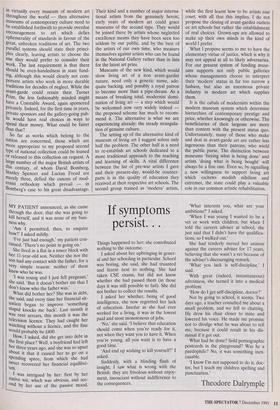If symptoms
persist..
MY PATIENT announced, as she came through the door, that she was going to kill herself, and it was none of my busi- ness why.
`Am I permitted, then, to enquire how?' I asked mildly. `I've just had enough,' my patient con- tinued. 'There's no point in going on.' She lived in a flat in a tower block with her 11-year-old son. Neither she nor the son had any contact with the father, for a very simple reason: neither of them knew who he was.
`I was young and I just fell pregnant,' she said. 'But it doesn't bother me that I don't know who the father was.'
What did bother her? She was in debt, she said and every time her financial sit- uation began to improve 'something stupid knocks me back'. Last month it was rent arrears, this month it was the television licence. They had caught her watching without a licence, and the fine Would probably be £400. How, I asked, did she get into debt in the first place? Well, a boyfriend had left her three years ago, and she was so upset about it that it caused her to go on a spending spree, from which she had never recovered her financial equilibri- um.
I was intrigued by her: first by her native wit, which was obvious, and sec- ond by her use of the passive mood. Things happened to her; she contributed nothing to the outcome.
I asked about her upbringing in gener- al and her schooling in particular. School was boring, she said, she had truanted and learnt next to nothing. She had taken CSE exams, but did not know whether she had passed them (in those days it was still possible to fail). She did not bother to collect the results.
I asked her whether, being of good intelligence, she now regretted her lack of education. Insofar as she had ever worked for a living, it was in the lowest paid and most monotonous of jobs.
`No,' she said. 'I believe that education should come when you're ready for it, not when they want you to have it. When you're young, all you want is to have a good time.' `And end up wishing to kill yourself?' I asked.
Suddenly, with a blinding flash of insight, I saw what is wrong with the British: they are frivolous without enjoy- ment, insouciant without indifference to the consequences. `What interests you, what are your ambitions?' I asked.
`When I was young I wanted to be a vet or work with children, but when I told the careers adviser at school, she just said that I didn't have the qualifica- tions, so I walked out.'
She had tenderly nursed her animus against the careers adviser for 17 years, believing that she wasn't a vet because of the adviser's discouraging remark.
`What you lack is self-discipline,' I said.
With great (indeed, instantaneous) adroitness, she turned it into a medical problem.
`How do I get self-discipline, doctor?'
Not by going to school, it seems. Two days ago, a teacher consulted me about a small problem, and we fell to chatting. He drew his chair closer to mine and lowered his voice. He made me promise not to divulge what he was about to tell me, because it could result in his dis- missal if it got out.
What had he done? Sold pornographic postcards in the playground? Was he a paedophile? No, it was something inex- cusable.
`I know I'm not supposed to do it, doc- tor, but I teach my children spelling and punctuation.'
Theodore Dalrymple


























































 Previous page
Previous page